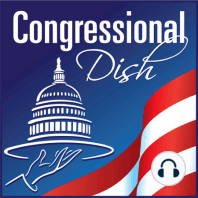50 min listen

CD151: AHCA – The House Version (American Health Care Act)
CD151: AHCA – The House Version (American Health Care Act)
ratings:
Length:
109 minutes
Released:
May 28, 2017
Format:
Podcast episode
Description
The American Health Care Act, the Republican plan for a new health care system, passed the House of Representatives at lightning speed. In this episode, get the backstory on the reckless process used to pass the bill, learn how it changed from the original version, and find out how the Congressional Budget Office expects the bill would affect you. Please support Congressional Dish: Click here to contribute using credit card, debit card, PayPal, or Bitcoin Click here to support Congressional Dish for each episode via Patreon Mail Contributions to: 5753 Hwy 85 North #4576 Crestview, FL 32536 Thank you for supporting truly independent media! Recommended Congressional Dish Episodes CD146: Repeal & Replace Bill Outline H.R. 1628: American Health Care Act of 2017 Bill Outline Title I: Energy and Commerce Subtitle A: Patient Access to Public Health Programs Section 101: Repeals the Prevention and Public Health Fund at the end of 2018 Section 103: Prohibits any Federal funding for any non-profit that performs abortions for a year Subtitle B: Medicaid Program Enhancement Section 111 : Reduces Medicaid funding Section 112: Ends the Medicaid expansion... For people under 65 years old whose income is less than 133% of the poverty line at the end of 2019 Ends the States' option to cover these people's families at the end of 2017 People in this category who have Medicaid on December 31, 2019 will be grandfathered in and will keep their insurance as long as they never go off of Medicaid for more than one month The Federal funding increase for states covering grandfathered individuals will only apply for people enrolled as of March 1, 2017 and is capped at 80% reimbursement rate Repeals the requirement that Medicaid cover “essential health benefits” as of January 1, 2020. Section 114: Prevents Medicaid for lottery winners Section 115: Gives $10 billion extra over five years to the “non-expansion States” Section 116: Forces States to verify Medicaid eligibility every six months and gives them more enforcement money Section 117: Allows States deny people Medicaid if they are not participating in "work activities" The State decides how long the person has to work for in order to get Medicaid The State can't deny Medicaid to... Pregnant women or to women who have had a baby within the last 60 days Kids under age 19 Only parents with kids under the age of 6 or a disabled child Gives the States more money for enforcement Subtitle C – Per Capita Allotment for Medical Assistance Section 121: Caps Medicaid funding on a per capita basis. States that spend too much one year will have their Medicaid cut the following year States will be allowed to get 10 year block grants instead Subtitle D: Patient Relief and Health Insurance Market Stability Section 131: Repeals the lower out-of-pocket limits for low-income people effective in 2020 Section 132: Creates a "Patient and State Stability Fund" to be administered by the Secretary of Health and Human Services to give money to the States until the end of 2026. Funds can be used for: Helping "high-risk individuals" buy insurance if they don't get coverage through their employer Giving money to insurance companies ("incentives") so they will lower premiums Taxpayers will pay insurance companies 75% of the claims made between $50,000 and $350,000 "Promoting access" to preventative care, including dental and vision Maternity & newborn care Mental health care and substance abuse treatment Reduction of out-of-pocket costs for people enrolled in health insurance in the State The fund is appropriated with $15 billion per year until 2020 and $10 billion per year until 2026. There will be an extra $8 billion a year put into the fund from 2018-2023 to pay for increased premiums and out-of-pocket costs of people in States that get a waiver In order to receive money from the Federal fund, States will have to match an increasing percentage, starting with 7%
Released:
May 28, 2017
Format:
Podcast episode
Titles in the series (100)
CD009: What’s In the Fiscal Cliff Bill: The back story on the "fiscal cliff" debacle, the House's sad excuse for a compromise, and the contents of the fiscal cliff bill that became law on 1/3/13. ‘‘American Taxpayer Relief Act of 2012'' TITLE I—GENERAL TAXES SEC. 101. PERMANENT... by Congressional Dish